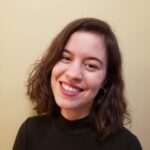
By Luisa Banchoff
It was June 17, 2017, and I was sinking back into my airplane seat, exhausted. I had just lived through ten of the busiest days of my life: I’d graduated from Princeton, attended a three-day fellowship orientation, hastily celebrated my twenty-second birthday with my family, and boarded a one-way flight bound for Botswana. In two days’ time, I would be at the front of a classroom of 28 twelve-year-olds, just as nervous and curious to meet me as I was to meet them.
Five years have passed since I sat on that plane. Since then, I have lived in three different countries, earned two master’s degrees, and lived through a pandemic. My eighteen months teaching at Maru-a-Pula School in Gaborone, Botswana – twelve months on a Princeton in Africa fellowship and six more as an employee of the school – have profoundly shaped my life trajectory, including my decision to pursue (and my ability to win!) a fully funded master’s degree at the London School of Economics through a Rotary Global Grant Scholarship.
How Princeton in Africa Led Me to the Rotary Global Grant Scholarship
My experience as a PiAf Fellow helped me explore my personal, professional, and academic interests beyond college – even if, ironically enough, it landed me in another classroom, this time as the teacher rather than the student. I graduated from Princeton with equal levels of excitement and apprehension about starting my post-grad life.
I had many professional interests I wanted to explore: I could further my academic career and go straight into grad school, apply to jobs in the non-profit sector, or spend some time exploring my interest in teaching. One of the most valuable aspects of my time in Botswana was that it gave me the time and space I needed to figure out what I wanted to do next.
Moreover, my experience teaching in a new country and culture reinforced my interest in social anthropology, the discipline I would end up studying as a Rotary Global Grant Scholar. As a world history teacher at a multicultural school in Botswana’s capital city, I worked alongside colleagues from dozens of countries in Africa and beyond, with a student body that was equally diverse. My everyday interactions at school and in Gaborone helped me gain an appreciation for the backgrounds, cultures, and belief systems of the people I encountered, as well as the values and concerns we hold in common. In short, my experience helped me develop the vocabulary I would later read and write as a student of anthropology, emboldening me to pursue graduate study in this field.
More than anything, being a PiAf Fellow was a great source of personal affirmation, boosting my confidence and encouraging me to put myself forward for opportunities I might have otherwise shied away from, including the Rotary scholarship. As a college senior, I was not too optimistic about my chances of receiving an offer from Princeton in Africa. I had heard about how competitive the fellowship was, and though I believed I had what it took to be a successful fellow, I didn’t think my academic and extracurricular focuses necessarily aligned with what the application committee was looking for. My acceptance felt like a vote of confidence in me and my interests, one that made me less reticent about seeking out subsequent opportunities, including the Global Grant Scholarship.
But it wasn’t until I reached Botswana that the real self-growth took place. Just two days after arriving, I was facing down my first workday: teaching from seven in the morning to midday, then leading after-school activities and holding office hours until late afternoon. I had to quickly brush up on the material I was teaching, draw up lesson plans, master the school layout and schedule, and get to know my colleagues in the history department and beyond. That was all before I set foot into the classroom. Once there, I had to memorize dozens of names, keep track of each student’s strengths and weaknesses, and stay in control of a classroom of nearly thirty energetic middle schoolers.
I quickly became aware of the skills I would need to prioritize: resilience, adaptability, communication, and collaboration. While I thought I had plenty of experience in each of these areas – after all, I spoke of them on my PiAf application – those first months in Botswana would show me just how much I had to learn.
But learn I did. By the time I returned home in December 2018, I looked back at the person I was eighteen months prior with amusement. The time in between had been one of the most difficult experiences of my life, but it enabled me to grow the skills I needed to face the challenges and, eventually, to enjoy the process. When I was asked to talk about these skills on my Rotary application, I was more prepared than ever to do so – with the confidence of someone who had walked the walk. I was confident that my skills and experience made a strong case for my candidacy.
Another source of wisdom that led me to apply for the Rotary scholarship was the fifty hard-working and ambitious young people who underwent the same experience as me that year: the other Princeton in Africa fellows. Like me, many of the PiAfs were recent college graduates who were also figuring out their next steps after the fellowship, and many were considering fellowships or graduate school scholarships.
Our discussions and interactions helped me learn about different opportunities and compare notes on the application experience. Since our time together, my fellow PiAfs have gone on to careers in the non-profit sector, to degrees in medicine and law, and to master’s and PhD programs. For me and for many others, being a part of this community has not only shaped our academic and professional interests, but also helped us learn about opportunities to further pursue these interests.
Framing My PiAf Experience in My Rotary Global Grant Application
Though I did not know it at the time, the experience of applying to and interviewing for Princeton in Africa would give me invaluable insights into the Global Grant Scholarship application process. While the two applications differ significantly, both are designed to find qualified and hard-working individuals who are committed to building relationships across international boundaries and contributing to the long-term well-being of underserved populations.
These common values are reflected in the types of questions I came across when applying and interviewing for PiAf and Rotary. In both cases, many of the questions were about the international aspect of the program; the application committee wanted to know what drew me to live abroad, the specific challenges I anticipated facing in a new country, and how I planned to live out the program’s international commitment during and after my time abroad.
The fact that I had already done an international fellowship suggested my commitment to international understanding and friendship, a fundamental part of Rotary’s vision and the cornerstone of the Global Grant Scholarship. The Rotary Club sponsoring my application later told me they had decided to support me in large part because of my international experience, which they believed would make me a competitive candidate for the next round of the application process.
It wasn’t just the fact of this experience that made my application successful, but rather the way I framed it within a broader narrative that linked my past experience with my academic and professional aspirations. Specifically, I discussed how intercultural and interfaith encounter has been a long-standing interest of mine, in my personal life (as the daughter of a German mother and American father, as a member of an on-campus interfaith group), academic interests (undergrad research projects focusing on Muslim-Christian dialogue and the Syrian refugee community in Berlin, Germany), and professional experience (as a researcher for a not-for-profit specially in faith-linked development work).
My time in Botswana was a continuation of these experiences, a reflection of my ongoing commitment to the same values as Rotary. Thus, being a PiAf fellow was invaluable to my Rotary application not only because it was an accomplishment in its own right, but because it was consistent with the narrative I was telling in my application.
Finally, some of the connections between my PiAf Fellowship and my Rotary application came from the most unexpected places. As I was giving a presentation to my local Rotary club about my time in Botswana, I remembered that one of my colleagues and friends had served as president of the Gaborone chapter of Rotary!
Drawing attention to small coincidences like these only deepened my relationship with Rotary: on my end, it gave me a greater appreciation for the global reach of the organization, and on Rotary’s end, it further demonstrated that I understood their vision and planned to live out their values as a Global Grant Scholar. This surprising connection affirmed my decision to draw on my experience in Botswana in my application.
Takeaways
Nearly two years have passed since I applied for the Rotary Global Grant Scholarship, and my life has taken some surprising turns since then. The Covid-19 pandemic changed the learning experience of my master’s program in ways I couldn’t have fathomed when I applied, but the experience has further strengthened my resilience and adaptability. Just as my time in Botswana led me to apply to the Rotary Global Grant Scholarship, it has continued to influence my path since then, extending the narrative in new and exciting ways.
Inspired by Luisa’s journey? Check out her Ultimate Guide to Winnning a Rotary Global Grant Scholarship.
Originally from Arlington, Virginia, Luisa is based in London, where she studies
© ProFellow, LLC 2022, all rights reserved.